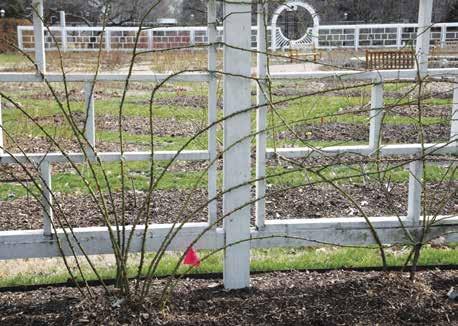
4 minute read
Dig This
Gateway Gardeners and Businesses in the News
FFA Award Winners
Each year the Missouri Future Farmers of America (FFA) awards statewide Proficiency Awards that recognize FFA members who excel as agricultural entrepreneurs, employees or volunteers while gaining hands-on career experience. The Missouri Green Industry Alliance (MoGIA) a statewide green industry group with many local members, sponsors two of these awards.
In the Nursery Operations category,
Josephine Horne
of Silex, Missouri, was the state winner. Horne, a graduate of Elsberry R-II High School, has worked at Forrest Keeling Nursery in Elsberry as part of her supervised agricultural experience program. Her responsibilities include planting and moving trees, pruning, watering, and pulling weeds. Horne observes and treats any trees or plants suffering from disease, insect damage or improper nutrition. She learned how to identify the trees by studying the characteristics of their bark, leaves and branch formation. In FFA, Horne competed at the state level in the poultry, agronomy and grasslands evaluation career development events. She is a graduate of Helping Youth Maximize Agricultural eXperiences Academy and Public Speaking Academy. Horne attended Washington Leadership Conference, National FFA Convention & Expo, Missouri FFA Convention and State FFA Leadership Camp. She also exhibited at the Missouri State Fair and North American International Livestock Exposition. Horne is currently attending Saint Louis University, St. Louis, where she is studying biochemistry and focusing on the pre-medical curriculum. Horne said, when she is home from college, she will continue working at the nursery. In the Landscape Management Proficiency Award category, Seth Evan Hildebrand of Marshfield was the State award recipient. Hildebrand, a senior at Marshfield High School, is a member of the Marshfield FFA Chapter, and his supervised agricultural experience involved managing his own mowing crew at Dunn Mowing & Landscaping, LLC, Marshfield. He maintains yards through mowing, trimming, pruning and removing trees. He is responsible for ensuring the direction and safety of his crew. Hildebrand continues improving his customer-service skills to ensure every customer is satisfied with his work and the work of his crew. Hildebrand said the favorite parts of his job are diagnosing and repairing equipment. In FFA, Hildebrand currently serves as chapter treasurer and previously served as chapter parliamentarian. In 2018, Hildebrand won the Area 10 Turf Grass Management Proficiency Award. He attended National FFA Convention & Expo, and Missouri FFA Convention. After graduating high school, Hildebrand plans to further establish his own business, Hildbrand’s Tree Works. Hildebrand said he hopes to have a recognizable community business and wants to be able to offer employee benefits.

Mineral Area College Discontinues Ag Program
The Mineral Area College agriculture program has been eliminated, effective June 30, 2021, along with numerous other programs due to extreme budget limitations caused in part by the effects of COVID-19 on enrollment and student
Gateway Gardeners and Businesses in the News
activities. As part of its general agricultural studies, MAC offered instruction on a wide range of horticulture topics, including Landscape Design, Greenhouse Management, Turfgrass, Herbaceous Landscape Plants, and more. Many professionals and workers in the area have benefitted from horticultural studies at MAC in addition to hands-on skills in their profession.
Public Prairie Garden Grants Available
The Missouri Prairie Foundation (MPF) recently announced t h a t gardening and other conservation groups, parks, schools, and other entities are invited to submit proposals to MPF’s Prairie Garden Grants Program. In 2021, MPF will award several grants to help fund the establishment of prairie gardens or plantings. Grants will not exceed $800 each. Those with smaller projects are encouraged to apply as well. Gardens must be available to the public and must incorporate native prairie species (not cultivars). Matching funds are not required, but proposals with secured matching funds may be evaluated higher than others. Deadline for submission is March 15, 2021 with funding dispersed in April. Please visit https://moprairie.org/mission/ grants/ for more details and an application form.

Keep Your Bird Feeders Clean
Though the backyard bird-feeding season may be winding down for some, it’s still a good time to tell newcomer bird-feeding enthusiasts as well as experienced feeders about the importance of maintaining sanitary feeders as well as the area underneath feeders. A report came out of the Northwest part of the country this winter about incidences of significant bird die-off related to birds catching salmonellosis from feeders and infected birds congregating at feeders. The phenomenon seemed to affect mostly finch species, especially pine siskins. Contributing factors may have been an uncommonly high number of the birds at feeders due to an irruption of the species. (An irruption occurs when some natural occurrence takes place at a species’ normal wintering grounds, causing greater numbers than usual to winter elsewhere, usually further south). Also contributing may be a greater than usual number of people introduced to bird feeding because of COVID-19 limitations. Whatever the cause, it’s always good practice to clean feeders regularly (monthly as recommended by the Audubon Society) as follows: Wear rubber gloves when handling feeders, and wash hands thoroughly afterward. Rinse the feeder with warm, soapy water, then dunk in a solution of 1 part bleach to 9 parts water. (You can substitute a 3-1vinegar solution to avoid bleaching out wooden feeders.) Rinse again thoroughly and allow to dry before refilling. Remove seed hulls and other debris that accumulate beneath feeders. Finally, if you notice sick or dead birds, wear gloves and wash hands thoroughly after disposing of them. Consider reducing the number of feeders, spacing them out, or taking them down altogether for a few weeks. Experts assure us there is plenty of food in the wild to sustain birds.





